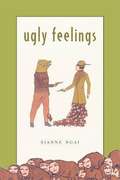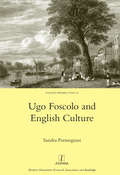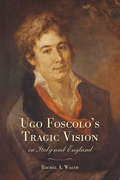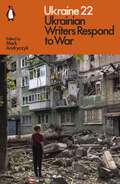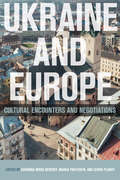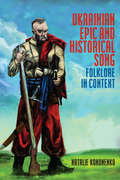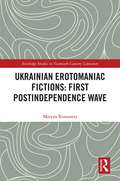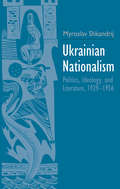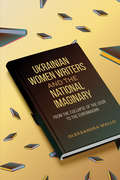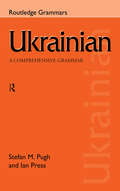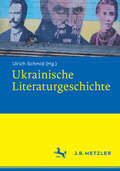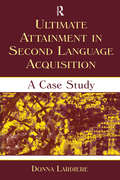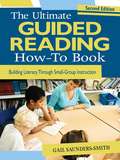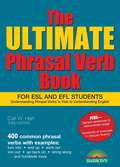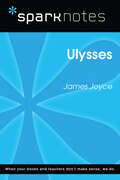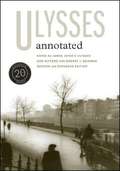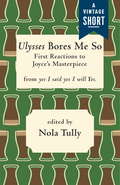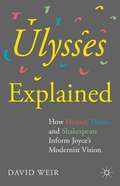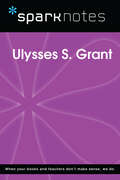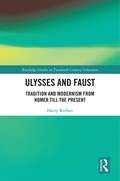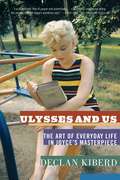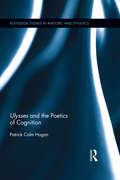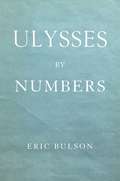- Table View
- List View
Ugly Feelings
by Sianne NgaiNgai mobilizes the aesthetics of unprestigious negative affects such as irritation, envy, and disgust to investigate not only ideological and representational dilemmas in literature--with a particular focus on those inflected by gender and race--but also blind spots in contemporary literary and cultural criticism. Her work maps a major intersection of literary studies, media and cultural studies, feminist studies, and aesthetic theory.
Ugly White People: Writing Whiteness in Contemporary America
by Stephanie LiWhiteness revealed: an analysis of the destructive complacency of white self-consciousness White Americans are confronting their whiteness more than ever before, with political and social shifts ushering in a newfound racial awareness. And with white people increasingly seeing themselves as distinctly racialized (not simply as American or human), white writers are exposing a self-awareness of white racialized behavior—from staunch antiracism to virulent forms of xenophobic nationalism. Ugly White People explores representations of whiteness from twenty-first-century white American authors, revealing white recognition of the ugly forms whiteness can take. Stephanie Li argues that much of the twenty-first century has been defined by this rising consciousness of whiteness because of the imminent shift to a &“majority minority&” population and the growing diversification of America&’s political, social, and cultural institutions. The result is literature that more directly grapples with whiteness as its own construct rather than a wrongly assumed norm. Li contextualizes a series of literary novels as collectively influenced by changes in racial and political attitudes. Turning to works by Dave Eggers, Sarah Smarsh, J. D. Vance, Claire Messud, Ben Lerner, and others, she traces the responses to white consciousness that breed shared manifestations of ugliness. The tension between acknowledging whiteness as an identity built on domination and the failure to remedy inequalities that have proliferated from this founding injustice is often the source of the ugly whiteness portrayed through these narratives. The questions posed in Ugly White People about the nature and future of whiteness are vital to understanding contemporary race relations in America. From the election of Trump and the rise of white nationalism to Karen memes and the war against critical race theory to the pervasive pattern of behavior among largely liberal-leaning whites, Li elucidates truths about whiteness that challenge any hope of national unity and, most devastatingly, the basic humanity of others. Retail e-book files for this title are screen-reader friendly.
Ugo Foscolo and English Culture
by Sandra Parmegiani"The history of the literary relations between Italy and England has its most celebrated early modern representative in Ugo Foscolo (1778-1827). Foscolo's translation of Laurence Sterne's A Sentimental Journey through France and Italy is often regarded as the benchmark of his English experience, but there is more - around and beyond his relationship with Sterne - that can be uncovered. With over 3,000 letters spanning three decades, Foscolo's correspondence represents a unique perspective from which to monitor his literary, philosophical, and political views. The 'Epistolario' is also a space in which Foscolo engages with literary, philosophical, and moral questions, and a place where he exercises an often private form of literary criticism. These are letters which ultimately produce one of the most complete yet most composite self-portraits in the history of modern Italian autobiography. In the first comprehensive and historicized reading of Foscolo's correspondence, Sandra Parmegiani reveals the rich and complex relations between the Italian writer and the literature, philosophy, and culture of eighteenth- and nineteenth-century England."
Ugo Foscolo's Tragic Vision in Italy and England
by Rachel A. WalshOne of the most celebrated Italian writers of the early Romantic period, Ugo Foscolo (1778-1827) was known primarily as a novelist, a poet, and a nationalist. Following the Napoleonic Wars, he lived in self-exile in England during the last decade of his life. There he wrote numerous critical essays and collaborated with Lord Byron and other well-known members of English literary circles.Ugo Foscolo's Tragic Vision in Italy and England examines an underexplored aspect of Foscolo's literary career: his tragic plays and critical essays on that genre. Rachel A. Walsh argues that for Foscolo tragedy was more than another genre in which to exercise his literary ambitions. It was the medium for an elaborate life-long process of self-examination and engagement with political and literary conflict. By analysing Foscolo's tragic struggles on and off the stage, Walsh sheds new light on his career and how it reflects on the important literary and political trends of the time.
Ukraine 22: Ukrainian Writers Respond to War
by Mark Andryczyk'The extraordinary writers in this volume articulate the taste, the terror, and the dialect of war; they command their powers of description to face a shameless empire intent on annihilating them' Ellena SavageA selection of Ukraine's leading writers convey the reality of life within Ukraine during the first year of the invasionOn 24 February 2022, the lives of Ukrainians were devastatingly altered. Since that day, many of Ukraine's writers have attempted to fathom what is happening to them and to their country. This anthology brings together writing from inside Ukraine, by Ukrainians, available in English for the first time. Here they document everyday life, ponder the role of culture amid conflict, denounce Russian imperialism and revisit their relations with the world, especially Europe and its ideals, as they try to comprehend the horrors of war.From tearing-downs of Russia's use of culture as justification of the war to moving descriptions of nights spent sheltering in corridors, poignant snatched moments with a husband on his single night away from the army, to descriptions of the eerie weather in the months leading up to the invasion, as if nature was trying to warn Ukraine, these essays reveal the texture, rawness and reality of life in Ukraine under war as never before.
Ukraine and Europe: Cultural Encounters and Negotiations
by Serhii Plokhy Giovanna Brogi Bercoff Marko PavlyshynUkraine and Europe challenges the popular perception of Ukraine as a country torn between Europe and the east. Twenty-two scholars from Europe, North America, and Australia explore the complexities of Ukraine’s relationship with Europe and its role the continent’s historical and cultural development. Encompassing literary studies, history, linguistics, and art history, the essays in this volume illuminate the interethnic, interlingual, intercultural, and international relationships that Ukraine has participated in. The volume is divided chronologically into three parts: the early modern era, the 19th and 20th century, and the Soviet/post-Soviet period. Ukraine in Europe offers new and innovative interpretations of historical and cultural moments while establishing a historical perspective for the pro-European sentiments that have arisen in Ukraine following the Euromaidan protests.
Ukrainian Epic and Historical Song: Folklore in Context
by Natalie KononenkoUkrainian epic, or dumy, were first recorded from blind mendicant minstrels in the nineteenth century. Yet they reflect events dating back to as early as the 1300s. Ukrainian Epic and Historical Song provides new translations in contemporary English. It also explains the historical events celebrated in epic and other historical songs: fierce battles, rebellion against tyranny, the struggles of captivity, the joys of escape from slavery. Natalie Kononenko’s expert translation and analysis of Ukrainian epics provides a sweeping social history of folklore that is vital to Ukrainian identity. A translation of at least one variant of every known epic is included. Whereas earlier trends in folklore scholarship emphasized genre purity and compartmentalization, Kononenko critically examines the events about which songs were sung. Her emphasis on the lives of ordinary people rather than on leaders reshapes our understanding of how epics were composed and performed. Kononenko’s ground-breaking analysis also illuminates Ukrainian self-understanding and explains how songs preserve and perpetuate historical memory. Scholars interested in epic song, history, and general folklore will benefit from this work. Members of the Ukrainian diaspora will find new appreciation of Ukrainian folklore.
Ukrainian Erotomaniac Fictions: First Postindependence Wave (Routledge Studies in Twentieth-Century Literature)
by Maryna RomanetsUkrainian Erotomaniac Fictions explores the aggressive sexualization of the Ukrainian cultural mainstream after the collapse of the USSR as a counter-reaction to the Soviet state's totalitarian, repressive politics of the body. While the book's introduction includes concise sections on such pornified cultural forms as advertising, mass media, visual art, and film, its major focus is on textual production that has contributed significantly to the literary explosion in Ukraine, which began in the 1990s. Drawing on cultural, postcolonial, feminist, and gender theories, the book examines transgressive potentials of the erotic under postcolonial, postcommunist, and post-totalitarian conditions. It offers insight into the convoluted dialectics between the imported conventions of Western "porno-chic" and the received oppressive Soviet gender and sexual ideologies. Within a broad historical and cultural framework, the study considers writers' engagements in dialogues with their own tradition and colonial legacy, as well as with a variety of transcultural flows. By bringing together diverse erotomaniac fictions, Maryna Romanets charts the ways in which they are embedded in the processes of Ukraine's cultural decolonization.
Ukrainian Nationalism
by Myroslav ShkandrijBoth celebrated and condemned, Ukrainian nationalism is one of the most controversial and vibrant topics in contemporary discussions of Eastern Europe. Perhaps today there is no more divisive and heatedly argued topic in Eastern European studies than the activities in the 1930s and 1940s of the Organization of Ukrainian Nationalists (OUN). This book examines the legacy of the OUN and is the first to consider the movement's literature alongside its politics and ideology. It argues that nationalism's mythmaking, best expressed in its literature, played an important role. In the interwar period seven major writers developed the narrative structures that gave nationalism much of its appeal. For the first time, the remarkable impact of their work is recognized.
Ukrainian Women Writers and the National Imaginary: From the Collapse of the USSR to the Euromaidan
by Oleksandra WalloSince the collapse of the Soviet Union, the Ukrainian literary world has not only experienced a true blossoming of women’s prose, but has also witnessed a number of female authors assume the roles of literary trendsetters and authoritative critics of their culture. In this first in-depth study of how Ukrainian women’s prose writing was able to re-emerge so powerfully after being marginalized in the Soviet era, Oleksandra Wallo examines the writings and literary careers of leading contemporary Ukrainian women authors, such as Oksana Zabuzhko, Ievheniia Kononenko, and Maria Matios. Her study shows how these women reshaped literary culture with their contributions to the development of the Ukrainian national imaginary in the wake of the Soviet state’s disintegration. The interjection of women’s voices and perspectives into the narratives about the nation has often permitted these writers to highlight the diversity of the national picture and the complexity of the national story. Utilizing insights from postcolonial and nationalism studies, Wallo’s book theorizes the interdependence between the national imaginary and narrative plots, and scrutinizes how prominent Ukrainian women authors experimented with literary form in order to rewrite the story of women and nationhood.
Ukrainian: A Comprehensive Grammar (Routledge Comprehensive Grammars)
by Ian Press Stefan PughUkrainian: A Comprehensive Grammar is a complete reference guide to modern Ukrainian grammar.The authors have consulted a great number of sources, in addition to a wide range of native speakers. The result is the first true reference grammar of Ukrainian to be published outside Ukraine, it will be the standard reference work for years to come.The volume is organized to enable students of the language to find the information they seek quickly and easily, and to promote a thorough understanding of Ukrainian grammar. It presents the complexities of the language in a systematic and user-friendly form.Features include* detailed tables in each chapter for easy reference* numerous examples throughout* thorough descriptions of all parts of speech* list of grammatical terms in English and Ukrainian* complete descriptions of the word-formational processes of Ukrainian* an overview of past and present changes in the language* bibliography of works relating to Ukrainian* full index.
Ukrainische Literaturgeschichte
by Ulrich SchmidDer offene Überfall Russlands auf die Ukraine im Februar 2022 hat der westlichen Öffentlichkeit die Wichtigkeit der ukrainischen Kulturgeschichte bewusst gemacht. Es mangelt allerdings an grundlegenden Handbüchern. Auf Deutsch liegt keine ukrainische Literaturgeschichte vor, die einen Überblick über die wichtigsten Autorinnen und Autoren sowie die Entwicklung der literarischen Genres geben würde. Es gibt eine Reihe von Fragen, der sich eine ukrainische Literaturgeschichte stellen muss. Wann und mit welchen Texten beginnt die Geschichte der ukrainischen Literatur? In welchen Sprachen und in welchem Raum vollzieht sie sich? Welche regionalen Besonderheiten sind zu beachten? Welche institutionellen Bedingungen ermöglichen und behindern den literarischen Prozess in der Ukraine? Schließlich ist noch auf ein wichtiges Spezifikum hinzuweisen. Eine ukrainische Literaturgeschichte kann keine Darstellung eines literarischen Prozesses sein, der unabhängig von seiner eigenen Reflexion, Historisierung und Institutionalisierung abläuft. Mit anderen Worten: Die ukrainische Literaturgeschichte „entstand“ nicht einfach, sondern sie wurde über weite Strecken als gewollte kulturelle Ordnung konstruiert.
Ulrike Meinhof and the Red Army Faction
by Leith PassmoreWith a communicative approach to the phenomenon of terrorism and new archival sources, the book documents Meinhof's journalism and terrorism (1959-1976) and challenges many of the established narratives that have calcified around the story of Meinhof and the history of Germany's most infamous terrorist group.
Ultimate Attainment in Second Language Acquisition: A Case Study
by Donna LardiereThe first book-length treatment of its type, Ultimate Attainment in Second Language Acquisition is a case study with a solid theoretical grounding that examines the language of an immigrant learner of English, and thereby presents a much needed understanding of the linguistic competence of second language speakers. Based on longitudinal data collected over a period of 16 years, this clear and accessible presentation is well-grounded in linguistic theory and in second language acquisition research issues. Author Donna Lardiere presents the narrative of Patty, an adult Chinese immigrant learner of English, who achieves native-like proficiency in some areas of her English idiolect, although reaches a plateau in her language acquisition, known as the concept of fossilization. By addressing this concept, a central idea in second language acquisition research, Lardiere fills a void in existing literature. Individual chapters focus on Patty’s end state knowledge of grammatical areas of finiteness, past-tense marking, word order, wh-movement and relativization, passivization, number marking, and use of determiners. Important topics discussed throughout the book include:*learner variability in production;*case study methodology;*the roles of motivation and prior language (L1) knowledge; and*sensitivity to input in circumscribing ultimate attainment in adult second language acquisition. Ultimate Attainment in Second Language Acquisition is intended for anyone whose research is in the areas of second language acquisition, language acquisition, theoretical, applied, or developmental linguistics. It is also appropriate for graduate level students of TESOL and teachers who work with more advanced learners of foreign languages.
Ultimate Guided Reading How-To Book: Building Literacy Through Small-Group Instruction
by Gail Saunders-SmithGeared towards primary school teachers to understand the foundation for literacy development
Ultimate Phrasal Verb Book, 3rd edition: For Esl And Efl Students
by Carl W. HartUpdated to reflect questions found on the most recent ESL tests, this book presents 400 common phrasal verbs as they are used in everyday English. Phrasal verbs are verbs combined with prepositions or adverbs. Familiarity with phrasal verbs and understanding their use as nouns (breakup, showoff, etc.) or adjectives (spaced-out, broken-down, stressed-out, and many others) is essential to ESL students. Updated information includes: the most commonly used phrasal verbs; activities and examples that reflect our current technology and the world around us; an expanded introduction for the teacher with a thorough breakdown and explanation of phrasal verbs; and, a discussion of separable and inseparable phrasal verbs in Unit I, and more. This book’s hundreds of examples in context and hundreds of exercises will be extremely useful to ESL students who are preparing for TOEFL or who simply wish to improve their English.
Ulysses (SparkNotes Literature Guide Series)
by SparkNotesUlysses (SparkNotes Literature Guide) by James Joyce Making the reading experience fun! Created by Harvard students for students everywhere, SparkNotes is a new breed of study guide: smarter, better, faster. Geared to what today's students need to know, SparkNotes provides: *Chapter-by-chapter analysis *Explanations of key themes, motifs, and symbols *A review quiz and essay topicsLively and accessible, these guides are perfect for late-night studying and writing papers
Ulysses Annotated: Notes for James Joyce's Ulysses (Revised and Expanded Edition)
by Robert J. Seidman Don GiffordPresents annotations to Joyce's classic that can inform any reading of "Ulysses". This volume includes annotations that gloss place names, define slang terms, give capsule histories of institutions and political and cultural movements and figures, supply bits of local and Irish legend and lore, and explain religious nomenclature and practices.
Ulysses Bores Me So
by Nola TullyThe publication of James Joyce's Ulysses was met with both hyperbolic praise and scorn: was Joyce's evocation of a day in the life of Leopold Bloom's Dublin a work of genius? Or was it drivel? Was it "an entirely new thing" (W. B. Yeats), or "a turgid welter of pornography" (Edith Wharton)? A "work of high genius" (Edmund Wilson) or something rather slighter: "Never did I read such tosh," Virginia Woolf wrote. In "Ulysses Bores Me So," a selection from the Bloomsday compendium yes I said yes I will Yes., the evidence is laid bare: the first reviews, letters, and reactions to the book that would change the course of literary history.
Ulysses Explained: How Homer, Dante, and Shakespeare Inform Joyce’s Modernist Vision
by David WeirIn 1929, T. S. Eliot claimed that "Dante and Shakespeare divide the modern world between them; there is no third. " Ulysses Explained argues that James Joyce may now be numbered along with Dante and Shakespeare among the giants of Western literature whose stature and status as an artist of the modern world has been confirmed by tradition. But there is another who walks beside them, closer to Dante and Joyce, certainly, though he occasionally brushes up against Shakespeare as well: the ancient poet Homer. These three figures command attention in any reading of James Joyce's Ulysses: Homer because he provides the narrative, Shakespeare because he supplies the plot, and Dante because he inspires the structure. This book shows how Joyce adapts classical, medieval, and renaissance traditions in Ulysses to advance his own modernist agenda of fragmented narrative, experimental structure, and psychosexual complexity.
Ulysses S. Grant (SparkNotes Biography Guide)
by SparkNotesUlysses S. Grant (SparkNotes Biography Guide) Making the reading experience fun! SparkNotes Biography Guides examine the lives of historical luminaries, from Alexander the Great to Virginia Woolf. Each biography guide includes:An examination of the historical context in which the person lived A summary of the person&’s life and achievements A glossary of important terms, people, and events An in-depth look at the key epochs in the person&’s career Study questions and essay topics A review test Suggestions for further reading Whether you&’re a student of history or just a student cramming for a history exam, SparkNotes Biography guides are a reliable, thorough, and readable resource.
Ulysses and Faust: Tradition and Modernism from Homer till the Present (Routledge Studies in Twentieth-Century Literature)
by Harry RednerUlysses and Faust: Tradition and Modernism from Homer till the Present examines the most important authors of Western literature: Homer, Virgil, Dante, Shakespeare, Cervantes, Marlowe, Goethe, Joyce, Eliot, Mann, Bulgakov and Pasternak, who based their works on one or other of the two key myths of the West, Ulysses and Faust. This volume provides a synoptic view of Western literature, as a foundation text for literary studies at all levels and as a way of encouraging people to once more engage with the major authors of our literary heritage. Ulysses and Faust considers the artistic revolution known as Modernism at the start of the twentieth century and the subsequent events in Europe, such as the World Wars and the totalitarian regimes, which led to a major break in Western civilization reflected in its literature. Consequently, these detailed critical studies illuminate their authors’ Weltanschauung, their view of life as it was lived in their time.
Ulysses and Us: The Art of Everyday Life in Joyce's Masterpiece
by Declan KiberdJames Joyce's famous 1922 novel Ulysses has been "wrenched out of the hands of the common reader" by esotericizing specialists, complains Kiberd (Anglo-Irish literature, U. College Dublin, Ireland), which is unfortunate because for all of its complexities the "underlying intention [of Joyce] was that anyone reading Ulysses could be an expert, at least in the sense that anyone present at a sporting event feels entitled to have a valid opinion on what transpires." He takes the reader through the episodes of Ulysses, focusing on themes of mundane pleasures, such as waking, walking, and drinking, in order to foster appreciation of Joyce's masterwork and better understanding of Joyce's work as a celebration of the richness of Irish daily life and popular culture. Annotation c2010 Book News, Inc., Portland, OR (booknews.com)
Ulysses and the Poetics of Cognition: Ulysses And The Poetics Of Cognition (Routledge Studies in Rhetoric and Stylistics)
by Patrick Colm HoganGiven Ulysses’ perhaps unparalleled attention to the operations of the human mind, it is unsurprising that critics have explored the work’s psychology. Nonetheless, there has been very little research that draws on recent cognitive science to examine thought and emotion in this novel. Hogan sets out to expand our understanding of Ulysses, as well as our theoretical comprehension of narrative—and even our views of human cognition. He revises the main narratological accounts of the novel, clarifying the complex nature of narration and style. He extends his cognitive study to encompass the anti-colonial and gender concerns that are so obviously important to Joyce’s work. Finally, through a combination of broad overviews and detailed textual analyses, Hogan seeks to make this notoriously difficult book more accessible to non-specialists.
Ulysses by Numbers
by Eric Jon BulsonUlysses has been read obsessively for a century. What if instead of focusing on the words to understand the structure, design, and history of Joyce’s masterpiece, we pay attention to the numbers?Taking a computational approach, Ulysses by Numbers lets us see the novel’s basic building blocks in a significantly new light—words, paragraphs, pages, and characters, as well as the original print run and the dates marking the beginning and end of its composition. Numbers provide access into Joyce’s creative process, enhanced by graphs, diagrams, timelines, and maps, and they also give us a startling new perspective on the proportions that continue to structure, organize, and pace the reading experience. Numbers are there to help us navigate the history of Ulysses from its earliest material beginnings, and they offer a concrete basis upon which we can explore the big questions about its length, style, origins, readership, and design.An innovative computational reading on both a micro and macro level, Ulysses by Numbers is a timely intervention into debates about the use and abuse of quantitative methods in literary analysis. Eric Bulson demonstrates how reading by numbers can bring us closer to the words of Ulysses, helping us rediscover a novel we thought we already knew.
